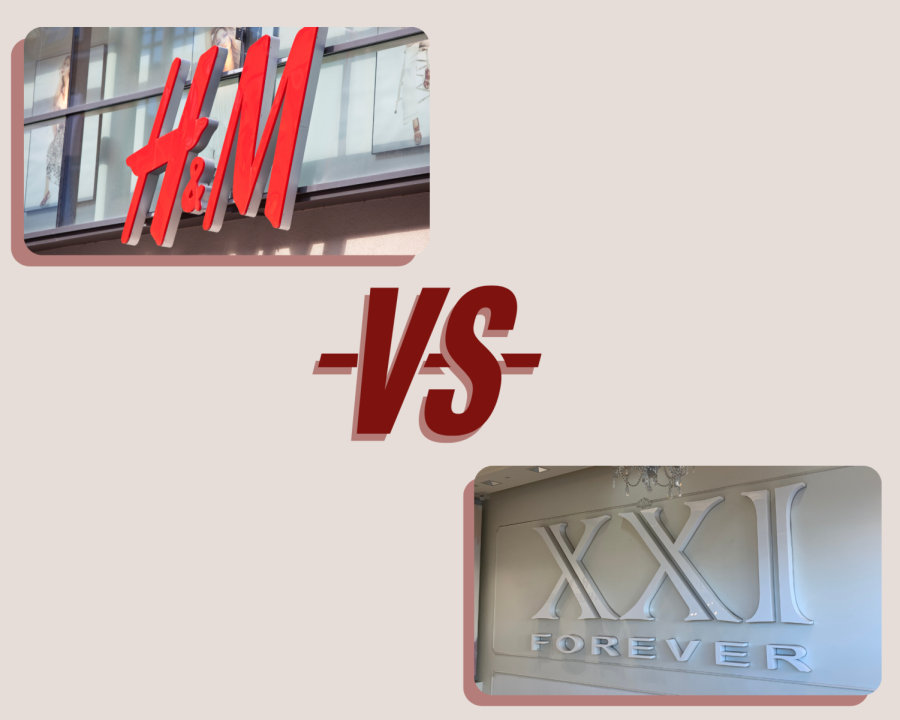H&M vs Forever 21: Sustainability edition
Samara Oregon Ruiz (made with Canva)
The sustainability of large companies have always been questioned, especially H&M and Forever 21.
You’re checking the price tag of a shirt in your favorite clothing store. You notice that it’s 100% recycled and think, “Well that’s great!”
You wonder, “What else in the store is recycled? What else is the store doing to help the environment?”
Sustainability has been talked about for a while now, and consumers are wondering when their shopping bag is going to be full of eco-friendly clothing.
Multi-billion dollar companies have the resources to ensure what we buy isn’t negatively affecting the planet. Companies like H&M have made many promises and have introduced an environmentally conscious clothing line into their stores. However, other fast fashion companies such as Forever 21 aren’t doing enough.
The goal for fast-fashion companies is to make the most profit with the least expensive products. This business model was designed to put out new, trendy clothing in two to six weeks. This is the opposite of high fashion, which is where many fast fashion companies get their inspiration from. This ideology is harmful in the long run because being sustainable is more expensive than being unsustainable.
Sustainability is a term that some understand, but some may not.
MCHS chemistry teacher and Eco Club adviser Micah You defines sustainability.
“Making sure that we’ll have the resources for future generations. Multiple generations removed from us will still have access to a lot of things we enjoy like, clean water, outdoors, being able to have clean air, and have a livable planet,” he said.
Both Forever 21 and H&M have started to work on the impact they have on the planet. The Swedish clothing company H&M has started selling garments made out of recycled materials, gives customers a coupon for bringing their recycled clothing to any of their stores, and has set a goal to be climate-positive by the year 2040.
The Korean-American garment company Forever 21 provides 100% recycled shopping bags in most stores, donates to American Forests Association, and is working on environmentally friendly clothing.
All of these concepts sound great, but the major difference between these two huge companies is that H&M has already introduced clothing that is either fully or partially made of recycled materials, and Forever 21 hasn’t. This should’ve been one of the first steps a company takes in order to be more sustainable.
Jamie Sanchez, an MCHS graduate, and H&M employee, describes the Conscious clothing line sold at H&M.
“The Conscious clothing line is more like essentials I would say, like sweaters or plain T-shirts which were mostly made out of recycled material. They’re seen as more conscious compared to normal clothes,” she said.
Forever 21 is planning to introduce a more eco-friendly clothing line to their stores, which is a good start that should’ve occurred a while ago.
Although Forever 21 uses recycled plastic bags, H&M uses brown paper bags, which are proven to be slightly better for the environment if used right. Both bags can harm the earth, but if misplaced, paper bags will biodegrade and plastic bags won’t. However, in terms of what is better for sustainability, there isn’t a clear answer; the best thing to do is reuse the bags you already have at home. This is an issue fast-fashion companies can’t necessarily control, but instead, they can heavily encourage consumers to bring their own bags.
One thing that both of these fast fashion companies have to work on is the labor conditions in which their products are being made.
Ethical working conditions can be seen as proper breaks within a working shift, a livable wage, safety regulations, worker benefits, etc.
Junior Keyla Bautista believes that sustainability and good labor conditions go hand in hand.
“They both affect the environment and the community, depending on where it takes place; they’re both social problems that affect us. The environment affects everyone,” she said.
However, we can’t leave the well-being of our planet in the hands of money-hungry companies. Fast fashion companies will never be completely sustainable; this is a truth we must face. But, it’s in all of us to push for environmentally-friendly clothing, businesses, and overall shopping experiences.
You said, “Whatever the consumer wants, the consumer gets.”

My favorite color is purple, I’ve been dancing since I was 5, and I love to read.





































